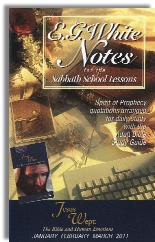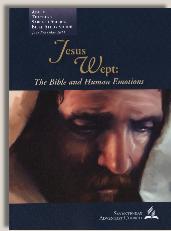|
||||||||||||||
Commentary on "Nature as a Source of Health"
Day 4: Tuesday, March 15, 2011 - God's Gifts Through Nature
OVERVIEW
This lesson opens with a statement regarding Romans 1:19-25. It states that humans (no doubt inspired by Satan) have turned away from the living God and worshiped the creation instead of the Creator. Jeremiah 10:12, 13 is given, then the writer asks what picture is presented of God’s creative power, His present involvement in natural phenomena, and what we can learn about the character of God through His created works. Next Psalm 19:1-6 is mentioned for the reader to paraphrase its message. There’s a statement about Seventh-Day Adventists and nature, referring to nature as their second book. The writer says, “Sometimes, when all else fails, the beauty of nature, and what it testifies to us about God, can be a source of great comfort and hope.” Finally, it ends with, “If while you are witnessing to someone about God’s goodness (especially as revealed in nature) the person brings up the question of tsunamis, earthquakes, famines, and the like, how would you respond? What does the reality of these natural disasters tell us about the limits of what nature can teach us about God?”
OBSERVATIONS
This really doesn’t have any specific or logical thread related to “God’s gifts through nature”. There mostly seems to be random thoughts about men and their worship of the created rather than God, God’s power, character and involvement in His creation.
We’ve already established previously what Psalm 19 says about the majesty and power of God. Jeremiah 10:12, 13 echoes Psalm 19, adding how His power, wisdom and understanding are what created the heavens and earth. These passages speak of natural revelation; observation of creation calls for an acknowledgment of God’s existence (Rom. 1:18-25). Nature should always point us to the author/Creator and His only inerrant Word—the Bible (2 Tim. 3:16, 17; Heb. 1:1-3).
While observation and enjoyment of creation are good, and reveal our Creator to us in amazing ways, the statement that “nature traditionally has been seen by Seventh-Day Adventists as God’s second book” is rather odd.
“The heavens declare the glory of God, and the sky proclaims the work of His hands. Day after day they pour out speech; night after night they communicate knowledge. There is no speech; there are no words; their voice is not heard. Their message has gone out to all the earth and their words to the ends of the inhabited world.” (Psalm 19:1-4b)
The Bible is telling us that everyone has received the awesome message of creation, so I’m not sure why Seventh-Day Adventists feel the need to insert this. This isn’t something that should be viewed differently by a certain denominational group. God only has one inerrant book, the Bible, and creation should nonverbally reinforce and point to what His Word says about Him, as all men are without excuse (Rom. 1:20).
In looking at comfort and hope, I’d like to say that looking to nature, and what it testifies to us about God “when all else fails” isn’t accurate. God, and His promises, will never fail. We shouldn’t be looking to nature, but going to God’s infallible Word when looking for comfort and hope.
“Blessed be the God and Father of our Lord Jesus Christ, the Father of mercies and the God of all comfort. He comforts us in all our affliction, so that we may be able to comfort those who are in any kind of affliction, through the comfort we ourselves receive from God.” (2 Cor. 1:3, 4)
“Dear friends, we are God’s children now, and what we will be has not yet been revealed. We know that when He appears, we will be like Him, because we will see Him as He is. And everyone who has this hope in Him purifies himself just as He is pure.” (1 John 3:2, 3)
“I have become its minister, according to God’s administration that was given to me for you, to make God’s message fully known, the mystery hidden for ages and generations but now revealed to His saints. God wanted to make known to those among the Gentiles the glorious wealth of this mystery, which is Christ in you, the hope of glory.” (Col. 1:25-27)
In wondering how to answer someone who brings up natural disasters, we should always point them to God’s Word. While creation undeniably speaks to us of an amazing Creator, it’s also under the curse of sin (Rom 8:22; 2 Pet. 3:13; Rev. 21:1). While we don’t understand all the “whys” of what happens, we do know that God is control (Job 38-41, 42:2). The story of Job reminds us that suffering happens to the righteous and the unrighteous alike. When we see that God is truly the God of all life, we have a comforting assurance that, whatever may happen, God’s good purposes for our lives will be accomplished. All of life is for God’s glory and for human good. So it is that when Job came to a realization of God’s sufficiency rather than his own, God’s greatest blessing followed. He also came to a revelation of God’s overwhelming majesty (we cannot question God’s justice as God does the questioning). This revelation moved Job to repentance—for he had made much of his own integrity, failing to recognize who was really in charge of things all along.
CONCLUSIONS
- Together Psalm 19:1-6 and Jeremiah 10:12, 13 tell how God’s creation declares God’s glory and power. Through His power, wisdom and understanding the heavens and earth were made.
- This “natural revelation” calls for an acknowledgment of God’s existence, and should always point us to the Creator—the Author of nature and His inerrant Word—the Bible (2 Tim. 3:16, 17; Heb. 1:1-3).
- Nature isn’t God’s “second book” for Adventists. “The heavens have declared the glory of God….and their message has gone out to all the earth and their words to the ends of the inhabited world.” (Psalm 19:1-4b).
- God, alone, is who we should look to for comfort and hope (2 Cor. 1:3, 4; 1 John 3:2, 3; Col. 1:25-27).
- We can’t look to nature for a complete picture of God. The Bible is what gives us an accurate picture—nature should always be secondary.
- Creation is under a curse (Rom. 8:22; 2 Pet. 3:13; Rev. 21:1).
- God is in control (Job 42:2), even if we don’t always understand why disasters and suffering happen (Rom. 8:28).
- Like Job, we should come to the revelation of God’s overwhelming majesty, leading to repentance (Job 6).
Copyright 2011 BibleStudiesForAdventists.com. All rights reserved. Revised March 13, 2011. This website is published by Life Assurance Ministries, Glendale, Arizona, USA, the publisher of Proclamation! Magazine. Contact email: BibleStudiesForAdventists@gmail.com.
The Sabbath School Bible Study Guide and the corresponding E.G. White Notes are published by Pacific Press Publishing Association, which is owned and operated by the Seventh-day Adventist church. The current quarter's editions are pictured above.
Official Adventist Resources
Standard Edition Study Guide Week 12
Teacher's Edition Study Guide Week 12


